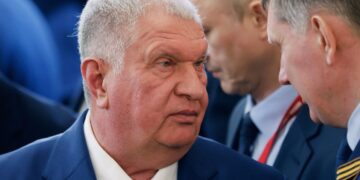ST PETERSBURG, Russia (Reuters) -Rosneft CEO Igor Sechin, one of the most influential men in Russia’s energy sector, said on Saturday that China was seeking complete energy independence and that in the foreseeable future it could become a major energy exporter.
China’s economic and military rise over the past 45 years is considered to be one of the most significant geopolitical events of recent times, alongside the 1991 fall of the Soviet Union which ended the Cold War.
Sechin said that a massive increase in electricity consumption was changing the entire landscape of the global energy markets as populations soared in Africa and Asia and the digital revolution triggered massive demand for power.
Speaking at the St. Petersburg International Economic Forum, Sechin said that China accounted for a third of global investment in the energy sector, was ramping up renewable energy capacity and was now one of the leaders in nuclear power.
“China, which has already ensured its energy security, is confidently moving towards complete energy independence, forming a stable energy balance based on its own resources,” Sechin said in a speech which referenced both Greek mythology and Niccolo Machiavelli.
“There is no doubt, taking into account the persistence and professionalism of our Chinese comrades, that in the foreseeable future they will achieve the desired result, which will turn China from an importer of energy resources into a major energy exporter.”
China is currently the world’s largest importer of crude oil and a major importer of natural gas. Russia is the world’s second largest oil exporter and holds the world’s largest reserves of natural gas.
Sechin, who worked alongside Vladimir Putin in the former imperial capital of St Petersburg and later under the president in the Kremlin, has run Rosneft since 2012.
Rosneft accounts for about 40% of Russian oil production, 14% of the country’s gas production and 32% of the refinery market. It is also the biggest Russian exporter of oil to China.
Sechin said that the decision by OPEC+ to speed up an output increase now looked far-sighted and justified in the light of the confrontation between Israel and Iran. He added that the OPEC+ group could bring forward its output hikes by around a year from the initial plan.
He drew attention to the vast U.S. debt pile, warning that great powers from Habsburg Spain and pre-Revolutionary France to the Ottoman Empire and Britain had declined due to high levels of public debt.
The expansion of the Western military-industrial complex was diverting enormous resources away from productive sectors and unlikely to be a panacea for the problems in Europe or the United States, Sechin said.
“There is always an asymmetrical answer,” he added.
But his focus was on China’s role, giving the example how the growth in the sales of electric vehicles had resulted in significant slowdown in motor fuel demand over the last year.
“If this trend continues – it may have a significant reverse impact on the oil market balance,” Sechin said.
He added than an important part of China’s strategy to reduce dependence on energy imports was the processing of coal into synthetic fuels and chemical products.
About 40 million tons of coal is used to produce synthetic fuels and more than 260 million tons for ammonia and methanol production, he said.
(Editing by Guy Faulconbridge)
By Vladimir Soldatkin and Olesya Astakhova


















